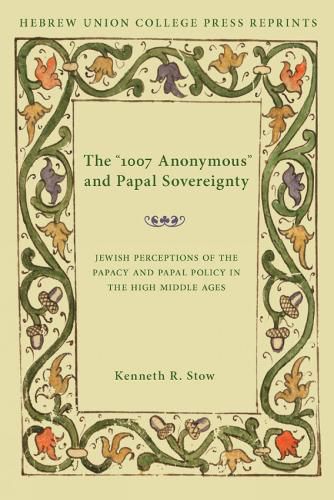Readings Newsletter
Become a Readings Member to make your shopping experience even easier.
Sign in or sign up for free!
You’re not far away from qualifying for FREE standard shipping within Australia
You’ve qualified for FREE standard shipping within Australia
The cart is loading…






Papal policy toward Jews in the Middle Ages has long been understood as a function of protection. The papacy either serves as the Jews’ foremost protector, wants assiduously to expel the Jews from Western Europe, or originally wanted to protect the Jews but allowed pressure from outside sources to sway them into a policy of repression instead.
Kenneth R. Stow shows that these views result from a misreading of stock formulae found in the prefatory clauses of papal letters. When Jewish discussions are taken into account, it becomes clear that papal policy was much more elaborate and complex, seeking to fully define the role of Jews within an ideal, pure Christian society. Stow’s sources include Meir ben Simeon of Narbonne (late thirteenth century) and the anonymous narrative of The Terrible Event of 1007. Many Jews saw continuities linking the principles of papal theory to those governing papal policy on Jews. Unlike so many kings who had made arbitrary decisions against Jews, the popes were proving themselves to be consistent in the enforcement of their established policies, good and bad. Because of this quality, Jewish thinkers advocated the acquisition of papal support.
The authority of papal canons was eventually challenged and the papal policy mandating a specific role for the Jews in Christian society ultimately failed. Against everything the popes and men like Augustine and Bernard of Clairvaux said and wrote, one by one, the Jews were partially or totally expelled from all of Western Europe. Eventually, the popes themselves abandoned their ideal of due legal process and succumbed to political realism.
$9.00 standard shipping within Australia
FREE standard shipping within Australia for orders over $100.00
Express & International shipping calculated at checkout
Papal policy toward Jews in the Middle Ages has long been understood as a function of protection. The papacy either serves as the Jews’ foremost protector, wants assiduously to expel the Jews from Western Europe, or originally wanted to protect the Jews but allowed pressure from outside sources to sway them into a policy of repression instead.
Kenneth R. Stow shows that these views result from a misreading of stock formulae found in the prefatory clauses of papal letters. When Jewish discussions are taken into account, it becomes clear that papal policy was much more elaborate and complex, seeking to fully define the role of Jews within an ideal, pure Christian society. Stow’s sources include Meir ben Simeon of Narbonne (late thirteenth century) and the anonymous narrative of The Terrible Event of 1007. Many Jews saw continuities linking the principles of papal theory to those governing papal policy on Jews. Unlike so many kings who had made arbitrary decisions against Jews, the popes were proving themselves to be consistent in the enforcement of their established policies, good and bad. Because of this quality, Jewish thinkers advocated the acquisition of papal support.
The authority of papal canons was eventually challenged and the papal policy mandating a specific role for the Jews in Christian society ultimately failed. Against everything the popes and men like Augustine and Bernard of Clairvaux said and wrote, one by one, the Jews were partially or totally expelled from all of Western Europe. Eventually, the popes themselves abandoned their ideal of due legal process and succumbed to political realism.